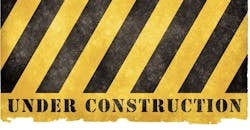If there’s something wrong with your website, it’s costing you business. And if you’re losing business, it’s costing you money—big money because your website is responsible for talking to people, people who are willing to spend $25K, $50K, $100K, or more on home improvements or hundreds of thousands of dollars on a new home.
You don’t see the people who check out your site and leave without contacting you because online, they just ... leave … and with them goes their checkbook and your next payroll or truck payment.
During my 20-plus years in construction marketing and website design, I’ve talked with hundreds of contractor companies of all sizes, and the one thing I know for sure is that 98% of them hate worrying about their website.
In fact, it took a good five to seven years for the construction industry as a whole to catch up to the idea that if you’re in retail construction, you need a website to drive lead generation.
RELATED
- Top Trends in Digital Sales and Marketing Strategies for Home Builders
- How Good Is Your Online Lead Follow-Up—Even in a Crisis?
- Seeing the Future of Online Sales
Your Construction Company Has a Website. What Now?
OK, so, willingly or not, you realized the value of an online presence and got your act together to build a website. Based on the builders and contractors I’ve worked with, I can guess that you and your website fall into one of three categories:
- You got your brother-in-law who likes to play with computers to build your site for you.
- You paid someone in the website business—but someone who doesn’t have experience building construction websites—to do it
- You figured “I build houses for a living, I can certainly build a website myself,” and you did it on your own.
Let me address why all three of these outcomes have probably left your website wanting.
Here’s why you’re losing ...
Family/friend scenario:
The “family/friend” website scenario is the most common. You hired someone close to you who convinced you they could build your site. So you threw them the keys and they whipped something up. It passes for good enough, and that’s what you’ve settled on.
Having no experience in construction or construction marketing, your brother-in-law just took whatever materials you had around in hard copy format and put them online. Basically, you got yourself an online brochure. It worked for a while, but now you realize your competitors have taken their online presence seriously and now they’re eating your lunch.
To be blunt, if most contractors treated their tools the way they treat their websites, they’d be out of business.
Paid a “pro” scenario:
I love working on these sites because most design shops throw up all over the screen and put everything possible on a website just to make it look pretty. Problem is, it doesn’t result in sales inquiries or conversions.
As with your brother-in-law, the issue is that the “pro” doesn’t have experience building new-home or construction-specific websites. Construction is an animal in and of itself, and your website is responsible for bringing in people who want to spend a lot of money. But because it isn’t set up to convert that kind of customer, it ends up costing you hundreds of thousands of dollars a year in lost customers (not to mention what you paid to get a lousy website).
DIY scenario:
If you think, “I build houses, so I can build a website,” guess what? I can build a deck, but you wouldn’t want to walk on it. In fact, these are often the worst websites I see, simply because website creation is not your core competency and you either don’t know where to go to get a good website, you think it doesn’t matter, or you are too cheap to invest in one.
Does This Website Make Me Look Bad?
I want you to do something right now: Go to your website, look at it as one of your customers would, and ask yourself, Would I buy a house or a remodel from this company?
If your answer is no, then you need to overhaul your website so it starts making you money.
If your answer is “I’m not sure,” that’s as good as a no.
Finally, if you said yes, you’re either too proud to admit your site is costing you money or you’re one of the 1% club that took building your site seriously and hired someone who has experience building websites for home builders and contractors and understands website lead conversion.
If you answered no or aren’t sure, there’s help for you. Here are six things I see the most.
RELATED
- 3 Inconvenient Truths About ‘Buy Online’
- Why (and How) to Right-Size Your Online Sales Program
- Four Builders That Succeeded During the Pandemic With Digital Sales and Marketing
6 Website Flaws That Cost Construction Companies Money
1. Not Enough Focus on Navigation
When designing a website, too many people spend little to no time focusing on site navigation. In fact, navigation is the sales funnel you want prospects to travel to get on your contact page or pick up the phone to call you. Navigation plays a huge part in the success or failure of a construction company’s website. Do it wrong and it will cost you.
2. Linking Away From Your Site
You know all of those trade groups you belong to? That profile you have on Houzz? The listing on a manufacturer’s website? They’re all costing you business if you link to them and thus take people off your website to investigate … and hope they come back (most will not).
3. Too Few Images
The key issue for most construction companies is simply not having enough photos of their work on their websites ... and far too many words. Swap the priority to show, not tell, about your work.
4. Talking Too Much About Yourself
We run websites through a platform that tells us how many times a company talks about itself versus how many times it mentions the customer. This number is normally skewed big time to the former. Contractors love to talk about all of the stuff they can do and how many awards they’ve won. That’s fine, as long as you do balance it (at least!) with customer-focused verbiage and benefits—messaging that resonates with them, not you.
5. Google Me
Google My Business is a big deal these days. Not only do you need to have a quality site, but you’d better have a robust Google My Business campaign going.
6. Apathy
Most contractors get to a place where they figure whatever they have online already is good enough. The logic is that, as long as the Jones’ have a way to find your number or email, that’s good enough. Let me tell you, it’s definitely not good enough.
To be blunt, if most contractors treated their tools the way they treat their websites, they’d be out of business. Conversely, if contractors would spend even half the time or money they spend on tools, certifications, their fancy pickup that hasn’t seen a pile of dirt in the back in years, they’d be turning away work instead of constantly hustling and sharpening their pencils to get it.
Darren Slaughter has spent 20-plus years helping contractors and construction brands sell more, advertise better, and market to buyers. His core focus is website design, copywriting, and marketing for construction brands. Contact him at [email protected].

